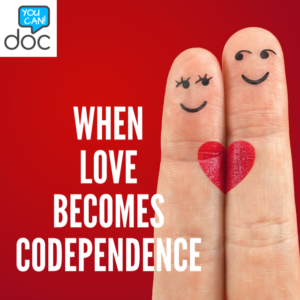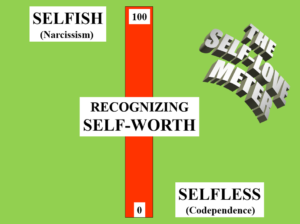
When Love Becomes Codependence
Having worked in the psychological profession for 40+ years I’ve learned techniques to determine whether or not a individual is emotionally healthy. One of the best and most effective way is determining the level of focus one has on him/herself. Here is the “Self-Love Meter” diagram I use when I talk about self- foucs.

SELFLESS (CODEPENDENCE)
This is how the “Self-Love Meter” works. The meter begins at the bottom and is identified with a “0” with the words “Selfless – (Codependence)”. Codependence is an extreme of self-love. It is a dysfunctional form of loving others. It occurs when one becomes so preoccupied about working out another’s problems that one’s own problems becomes neglected. A personal experience can teach this idea. As a psychologist, I often have the opportunity to be in psychiatric wards. I recall one occasion when a good member of a local Christian church was hospitalized. The referring psychiatrist described her as having so overextended herself in serving others that she had experienced what many would call a “nervous breakdown.” I arrived at the hospital early Saturday morning and began to look for this patient. She wasn’t in her room or on the wing. As I poked my head into her assigned room, all I saw was a small pile of what appeared to be dirty laundry on her bed. I asked at the nurse’s desk and discovered that this good sister was across the hall doing the laundry of fellow patients. This Christian Sister always went the “extra mile” no matter what her personal circumstances. If the Clergy needed her to visit someone or do something, she was always there. She had a very hard time in saying “no.” She would leave her home immediately when called upon, whether eating dinner with her family, reading her scriptures, or even while praying. Even while in the hospital she was found doing the laundry of other patients while her own laundry was left undone. This sister truly lost herself in the service of others. She believed that by “giving, giving, giving” she would find peace and happiness. Instead, she found herself inpatient in a psych ward.
“Selfless” is characterized by: No pleasure in receiving; Interest only in others; Wants everything for others; Sees nothing but others; Overlooks needs of self; and Helps others avoid pain. She has withdrawn love from self and turned it towards others. In conclusion, using a faith-based scenario she was so busy serving others she was distant from “God.”
SELFISH (NARCISSISM)
The meter ends at the top and is identified with a “100” with the words “Selfish – (Narcissism)”. Selfish example: The myth of Narcissus is one of the most known Greek Myths, due to its uniqueness and moral tale; Narcissus, was the son of River God Cephisus and nymph Lyriope. He was known for his beauty and he was loved by God Apollo due to his extraordinary physique. Narcissus was the object of the passions of many young women and nymphs, but he was indifferent to it all. The nymph Echo, fell in love with him but she could get no more from him than the others could. In despair, she withdrew into a lonely spot where she faded away until all that was left of her was her sorrowful voice. Because Narcissus didn’t love her the ways she wanted him too.The young women rejected by Narcissus asked the heavens for vengeance. Nemesis heard them and arranged for Narcissus’ punishment. One very hot day, Narcissus bent over a stream to take a drink and saw his own face, which was so handsome he immediately fell in love with it. From then on the stayed there watching his own reflection until he died. This narcissism occurs when a person becomes so preoccupied with him/herself that he/she neglects others. A narcissist only thinks of themselves. He has withdrawn love from others and turned it toward self. Narcissus believed that by “taking, taking, taking” he would find peace and happiness. Over the years I’ve been involved sending many folks with “narcissistic” traits to prison!
“Selfish” is characterized by: No pleasure in giving; Interest only in self; Wants everything for self; Sees nothing but self; Overlooks needs of others; and Avoids personal pain. In conclusion, using a faith-based scenario Narcissus was so busy serving himself he was distant from “God.”
SELF-WORTH
Self-worth, a healthy emotional state, is a balance between the two “focus on self” and “focus on others.” However, there is one overriding principle:
When you become so preoccupied and worried about another person that they neglect their own personal – emotional, physical and spiritual needs – It is always dysfunctional.
A person with a healthy self-worth receives and gives with pleasure; Interested in self & others.There are certain emotional, physical, and spiritual needs each of us have. We are responsible for meeting these needs. You will have to decide what those emotional, physical and spiritual needs are for yourself. For me, there is a certain amount of sleep I need; time to ponder and read scriptures; and certain amount of exercise.
Join me in Facebook Life: When Love Becomes Codependence
